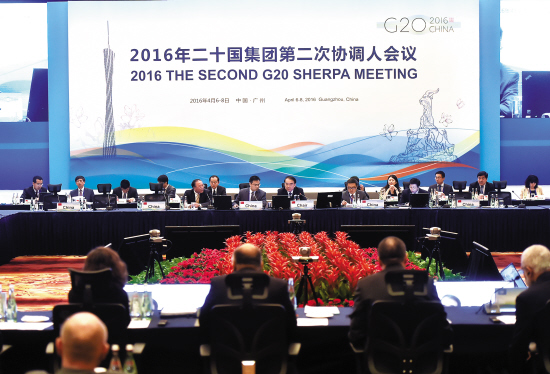G20 reaffirms climate pledges before Hangzhou summit

A statement on climate change proposed by China was issued in the Second G20 Sherpa Meeting recently held in Guangzhou, China.
Participants in a planning meeting for the upcoming G20 Summit, scheduled to take place in September, approved a statement on climate change that China proposed.
The statement reiterated the position that climate change is one of the greatest challenges facing the world today and praised the Paris Agreement, calling it a comprehensive, balanced and ambitious document guided by such principles as equality and common but differentiated responsibilities. The G20 reached a consensus to move forward under the framework established by the Paris Agreement.
Common global challenges like climate change cannot be solved effectively by any one individual state. Global governance on climate change should be negotiated on and coordinated, said Danny Bradlow, professor of international development law and African economic relations at the University of Pretoria, South Africa.
The Paris Agreement has shown us its ambition by recognizing the need to stabilize the climate at a temperature rise of no more than 2 degrees Celsius above pre-industrial levels. But it is basically meaningless if it is not accompanied by vigorous, rapid action to reduce emissions, said William Steffen, professor emeritus at the College of Medicine, Biology and Environment at Australian National University.
Steffen said the tendency among nations to place self-interest above the common good is an obstacle to global climate governance. The intransigence of vested interests and the lack of international legal mechanisms further contribute to the problem. If one of the major emitters refuses to cooperate in the collectively coordinated actions, it will derail the whole process, he said.
China has been a responsible country in global climate governance, and it has been proactive in its efforts to reduce emissions. As a developing country, China has done more than its share, said Zhang Lihua, a professor of international politics at College of Administration at Jilin University.
China’s participation in the Paris talks demonstrated that the nation is playing a leading role in global governance. China has a record of meeting or exceeding its pledges. If China meets its commitments made in Paris, it will prove to the rest of the world that it is possible for a country to reduce emissions while maintaining a healthy economy, Steffen said.
